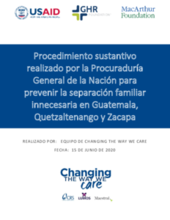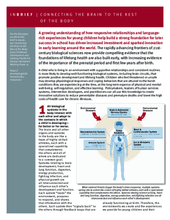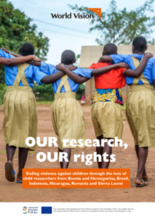This page contains documents and other resources related to children's care in the Americas. Browse resources by region, country, or category.
Displaying 851 - 860 of 3191
This study extends our understanding of use of failure to protect (FTP), a sub-type of neglect, by examining who workers substantiate for FTP, in what context, and the justifications they use.
El objetivo principal del informe es sistematizar el procedimiento sustantivo en los Departamentos de Guatemala, Quetzaltenango y de Zacapa realizado por Procuraduría General de la Nación (PGN) en el que se individualiza el tipo de amenaza o vulneración en el caso concreto e identifica si la misma puede ser resuelta mediante una intervención gubernamental específica, sin necesidad de intervención jurisdiccional y su análisis. El documento contiene un estudio del Sistema de Gestión para la Atención Integral de la Niñez y la Adolescencia, en relación al funcionamiento por parte de la Procuraduría General de la Nación de Quetzaltenango, Guatemala y Zacapa, y un análisis de casos resueltos judicialmente en Zacapa que podrían haberse tramitado previamente en la vía administrativa y evitar la institucionalización (gatekeeping mechanism en ingles)
FICE Israel decided to initiate a short survey to document and share information about the way different countries handled their policies and practices in residential care facilities during that period. This report presents findings and some conclusions from this primary survey.
This brief describes some of the "compelling evidence that the foundations of lifelong health" are built in the early years of life, "with increasing evidence of the importance of the prenatal period and first few years after birth."
This child-led research initiative was conducted under the umbrella of World Vision’s DEAR project (Development Education and Awareness Raising) and the Sustainable Development Agenda 2030. The study explores explore SDG 16.2, the goal that focuses on the issue of ‘abuse, exploitation, trafficking, and all forms of violence against and torture of children’.
This paper explores how college graduates with foster care histories fare after graduating from a 4-year college that offered a campus-based program.
The first aim of this study was to examine differences in the socio-emotional functioning of adopted and institution-reared children in Chile. The second aim of this study was to examine the influence of adoption related variables on the psychological adjustment of adopted children.
This study selected children who remained in kinship care (N = 267) for three waves from nationally representative data and examined the longitudinal associations among poverty, economic pressure, financial assistance, and children’s behavioral health outcomes in kinship care.
This study uses secondary data analysis of the Canadian Incidence Study of Reported Child Abuse and Neglect 2008 to explore what case and worker factors predict the provision of ongoing child welfare services.
"Latin America has been declared the new epicentre of the global COVID-19 pandemic," says this press release from SOS Children's Villages. "With weak healthcare systems, informal economies and high levels of inequality, the crisis presents an unprecedented challenge for struggling families. Children are especially vulnerable and their families risk collapsing."





